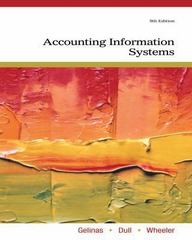Question
I'm having trouble finding out if this document is relevant and accurate to this year in 2019. Case 151 Arts Corporation offers a generous employee
I'm having trouble finding out if this document is relevant and accurate to this year in 2019.
Case 151
Arts Corporation offers a generous employee compensation package that includes employee
stock options. The exercise price has always been equal to the market price of the stock at the
date of grant. The corporate controller, John Jones, believes that employee stock options, like all obligations to issue the corporation's own stock, are equity. The new staff accountant, Marcy Means, disagrees. Marcy argues that when a company issues stock for less than current value, the value of preexisting stockholders' shares is diluted.
Required:
1.Describe how Arts Corporation should account for its employee stock option plan, under
existing U.S. GAAP.
2.Pretend you are hired to debate the issue of the proper treatment of options written on a
company's own stock. Formulate your argument, citing concepts and definitions to
buttress your case, assuming:
i.You are siding with John
ii.You are siding with Marcy
Old coursework that I dont know whether its out dated out not in regards to ASC No. 718. If anyone has an updated version that would be terrific.
a.Under FASB ASC 717-10-25-2, an entity shall recognize the services received in a share-based payment transaction with an employee as services are received. Employee services themselves are not recognized before they are received. The entity shall recognize either a corresponding increase in equity or a liability, depending on whether the instruments granted satisfy the equity or liability classification criteria. As the services are consumed, the entity shall recognize the related cost. For example, as services are consumed, the cost usually is recognized in determining net income of that period, for example, as expenses incurred for employee services. In some circumstances, the cost of services may be initially capitalized as part of the cost to acquire or construct another asset, such as inventory, and later recognized in the income statement when that asset is disposed of or consumed. This Topic refers to recognizing compensation cost rather than compensation expense because any compensation cost that is capitalized as part of the cost to acquire or construct an asset would not be recognized as compensation expense in the income statement. The amount of compensation for compensatory ESOPs is determined on the Grant date.The grant date is the date at which an employer and an employee reach a mutual understanding of the key terms and conditions of a share-based payment award. The employer becomes contingently obligated on the grant date to issue equity instruments or transfer assets to an employee who renders the requisite service. Awards made under an arrangement that is subject to shareholder approval are not deemed to be granted until that approval is obtained unless approval is essentially a formality (or perfunctory), for example, if management and the members of the board of directors control enough votes to approve the arrangement. Similarly, individual awards that are subject to approval by the board of directors, management, or both are not deemed to be granted until all such approvals are obtained. The grant date for an award of equity instruments is the date that an employee begins to benefit from, or be adversely affected by, subsequent changes in the price of the employer's equity shares.
b..i.John believes that employee stock options are equity securities.His opinion is consistent with prior practice.This position implies that options are nonreciprocal transfers wherein the corporation receives something of value but gives up nothing in return.Because the option contracts do not obligate the corporation to give up assets or perform future services, they do not meet the definition of liabilities.In addition, their value is derived solely from the underlying market value of the company's stock - i.e., their existence and worth are derived from the value of equity.Because the options exist only to allow the holder to acquire stock, their issue price is similar to a down payment toward the eventual purchase of stock, implying further that the options are equity securities.
ii.Marcy believes that preexisting stockholders are hurt by the exercise of stock options.If so, the option holder is not acting as an owner in the role of owner.Hence, it can be argued that options do not fit the definition of an equity security.Proponents of this view hold that options are debt or quasi-equity.Those who argue that options are liabilities consider the obligation to issue the shares, particularly to the detriment of preexisting shareholders, is a liability.It is argued that the liability could be settled at any time prior to exercise by purchasing the options from the option holder at the then current market price.If so, an appropriate measure of the option's value at the balance sheet date is fair value.If the options are not equity, then changes in fair value would fit the definition of earnings and should be recognized in the income statement.
Please let me know if this is still relevant in 2019.
Step by Step Solution
There are 3 Steps involved in it
Step: 1

Get Instant Access to Expert-Tailored Solutions
See step-by-step solutions with expert insights and AI powered tools for academic success
Step: 2

Step: 3

Ace Your Homework with AI
Get the answers you need in no time with our AI-driven, step-by-step assistance
Get Started


